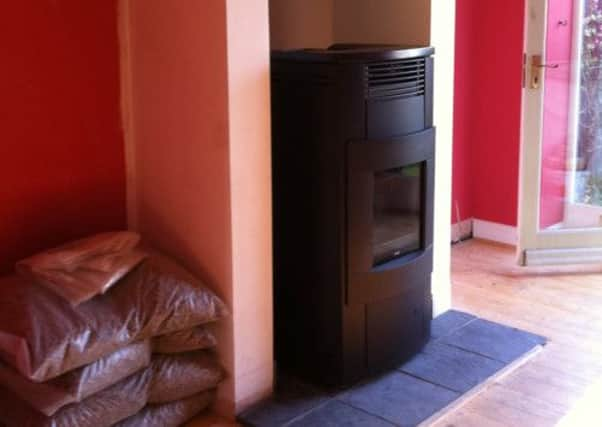Converting to biomass could pay dividend for oil users


As fuel costs rise, the search for cheaper heat has intensified and those with oil-fired boilers are leading the hunt.
Piped gas at 4.8p per k/w hour isn’t usually an option for those who rely on oil, which is around 6p per kwh. Conventional alternatives, LPG at 7.6 per kwh, and electricity, 14.5p per kwh are even more expensive.
Advertisement
Hide AdAdvertisement
Hide AdIt’s why a growing number of households are turning their attention to biomass boilers fired by wood pellets, which costs around 4.2p per kwh.
At around a third less than the price of oil it would be a no brainer were it not for the costs of installation, which range from £7,000 to around £12,000.
“The savings on oil means that it is a good investmen but some people still hesitate because of the initial outlay,” says Amanda Botterill, Director of Guiseley-based Yorkshire Solar Consulting and Chair of the Yorkshire Microgeneration Partnership, who adds that the government’s proposed renewable heat incentive (RHI) scheme for domestic biomass boilers should boost the market.
The domestic RHI looks set to be announced later this month and follows a similar scheme for commercial systems.
Advertisement
Hide AdAdvertisement
Hide Ad“The benefits of fitting biomass in a commercial setting have been immense,” says Amanda Botterill. “Not only do you save a third on their fuel bills if you switch from oil, you get the RHI payment. A small office can get an annual RHI of £3,000 and a large factory around £60,000.
“We expect the domestic RHI to be in line with the commercial rate. It is expected to run for seven years and the annual payment on a 25kw boiler should be between £2,500 to £3,000 a year.”
Although only 0.5% of boiler sales in Britain are biomass, they are widely used in Sweden and are popular in Germany and Austria.
“I wouldn’t recommend them as an alternative to gas as that is still cheaper but it certainly makes financial sense when compared to oil, especially if your boiler needs replacing anyway,” says Amanda, who a biomass heating system in her own home.
Advertisement
Hide AdAdvertisement
Hide AdAndrew and Christine Ridley agree. When they renovated their cottage near Kirkbymoorside in North Yorkshire they were keen to find a cheaper, greener alternative to oil, which was costing them about £900 a year.
“We needed a new boiler and heating system anyway. The cost of installation for a biomass boiler was about £10,000 but the running costs are about a third cheaper and it’s carbon neutral,” says Christine.
The Ridleys have a room-based boiler, which works in a similar way to the old-fashioned back boilers.
The couple feed a stove with wood pellets bought in bulk and this runs the central heating and heats the water. They also have a solar panel for hot water plus an immersion heater as backup.
Advertisement
Hide AdAdvertisement
Hide Ad“It isn’t like an oil or gas system as you have to keep feeding the stove with pellets and the programming is different but you get used to it and the fuel savings are well worth it,” says Christine.
There are two types of domestic biomass boiler. For smaller properties, a room-based system is best and least expensive costing around £8,000 to £10,000 to install. You need to have a chimney for the stove and space for a hot water cylinder but it can plumb into existing radiators.
“It is more labour intensive than a gas or oil boiler in that you have to feed the wood burner with pellets and you have to clean it out once a week,” says Amanda.
“However, if you have a large house then you can have a utility boiler, which is fed with pellets from a hopper automatically. This costs between £15,000 and £20,000 to install and you need more space for it, but the running costs for this are even cheaper because you can buy the wood pellets in bulk.”
Advertisement
Hide AdAdvertisement
Hide AdAnnual maintenance, including a service and a flue sweep, costs about £125 for a room boiler system and £200 for a utility boiler. All the boilers are imported and getting parts can take weeks so finding a reputable installer with a good supplier is crucial.
It is also important to check the supply of wood pellets. Although it is said to be be carbon neutral, environmental concerns about biomass were on the news agenda again this week and largely relate to imported pellets containing palm oil. Rainforests have been decimated to feed industry’s demand for the oil. There are also concerns that biodiverse forests being replaced with single species for biofuel.
Many of the pellets used in domestic boilers in Yorkshire are made from compacted sawdust and are a by-product from the timber industry.
“Everyone asks where the pellets come from and if they will run out. In Yorkshire we have a big supplier in Ripon, which helps, ”says Amanda, who is most concerned that a RHI will lead to a flood of inexperieced installers. Anyone thinking of buying a biomass boiler should do their homework and find a reputable installer with experience of the product.
www.biomassenergycentre.org.uk. Yorkshire Solar Consulting, www.yorkshire solar.com